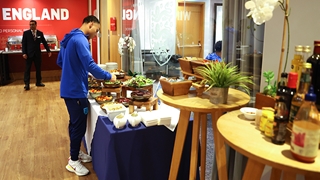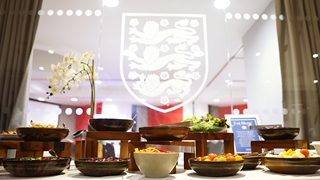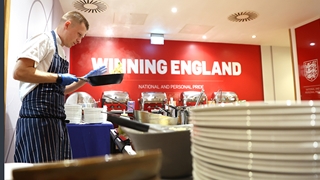
Nutrition has firmly become established as a key part of elite athlete’s training and performance, with ongoing research highlighting the importance of certain food groups at key times to maximise an individuals output in the arena, and recovery thereafter.
Since 2017, Dr Christopher Rosimus has been The FA’s Performance Nutrition Lead, and is the man responsible for ensuring England’s players benefit from the very best insight into nutrition for training, matches and recovery. Working across eight of England’s teams, Chris has developed the performance nutrition curriculum and programme that is implemented at all age groups by FA physical performance coaches, as well as working closely with the catering teams at St. George’s Park’s Hilton Hotel to deliver varied, high-quality food at key points.
It's an in-depth area of work that largely goes unseen by the public, despite yielding crucial results.
“Nutrition is part of the physical performance, medical and nutrition department, or PPMN, at St. George’s Park,” explains Chris.
“Each area has different disciplines and functions; medical, physio, physical performance, and nutrition. We have to provide an equity of service delivery across all teams. My model is set up where I deliver an equity of service delivery, but not every element of delivery is the same. For teams that are non-tournament teams, the general nutrition delivery will be facilitated by the physical performance coaches that are with the team all the time. I then act more as a consultant and advise them on strategy dependent of their resources. It means I am then available to give more support to the teams that are going into tournaments.
“We have two nutritionists with the seniors; one that’s with the team all the time and myself acting as strategic support in the background,” he adds. “Strategy and prioritising play a big part in the function of the department, making sure that every team receives a high level of service.”
Alongside the team’s coaches and their respective players, Chris highlights the relationship he’s forged with the kitchen staff at St. George’s Park’s Hilton Hotel as essential to the successful delivery of his programmes.
“We have five FA consultant chefs that are strategically placed across the various teams connected to the Hilton, and they’re a great team,” Chris reveals. “What is clear is that an effective nutritionist is only as effective as the catering team they’re working with. Essentially, we’re giving the players an understanding of fuelling an endurance event in order to cope with the physical demands on a major tournament. However, you really want them to enjoy their food. They’re here 24 hours and they’re going to eat at least three times a day. Food can contribute to a positive or a negative environment, and when you see players enjoying their food, you get positive feedback and know that they’re fuelling because they enjoy the food, but they’re also fuelling through eating the right way. You underpin that with some education – and that’s rewarding, because you know how challenging the process has been in the background to get to that stage.”
With these factors in mind, Chris – who has also worked with the England and Wales Cricket Board (ECB), Nottingham Forest and Leicester City (during a period in which the Foxes won the Premier League title) – highlights the role that the facilities at St. George’s Park play in allowing optimised nutrition to be implemented across England’s teams.
“The role St. George’s Park plays in allowing everything to be delivered is massive,” he says.
“You can adapt so much in terms of what you want to achieve, because the facilities at St. George’s Park are so good. You can play around with interventions to suit the environment you’re in. For example, there are really good recovery facilities at SGP, such as the cryotherapy chamber and the hydro area. Players usually go in there because they’re going through an element of recovery. That allows you to bolt nutrition options around that environment, which enables them to take a particular recover product that they may not have taken. Because they’re engaging in recovery through facilities and equipment, their mindset allows nutrition to be added on.
“The Hilton Hotel is essential,” Chris continues. “Without the facility to deliver high-quality food multiple times a day, multiple times a year, the nutrition education and advice is flawed. Having that facility is absolutely massive. The people within SGP play a big part, too. You can always get things done here. There’s a ‘can do’ attitude across the board. The facility is great, but it’s up to us to make it work for us as best as possible as well.”












